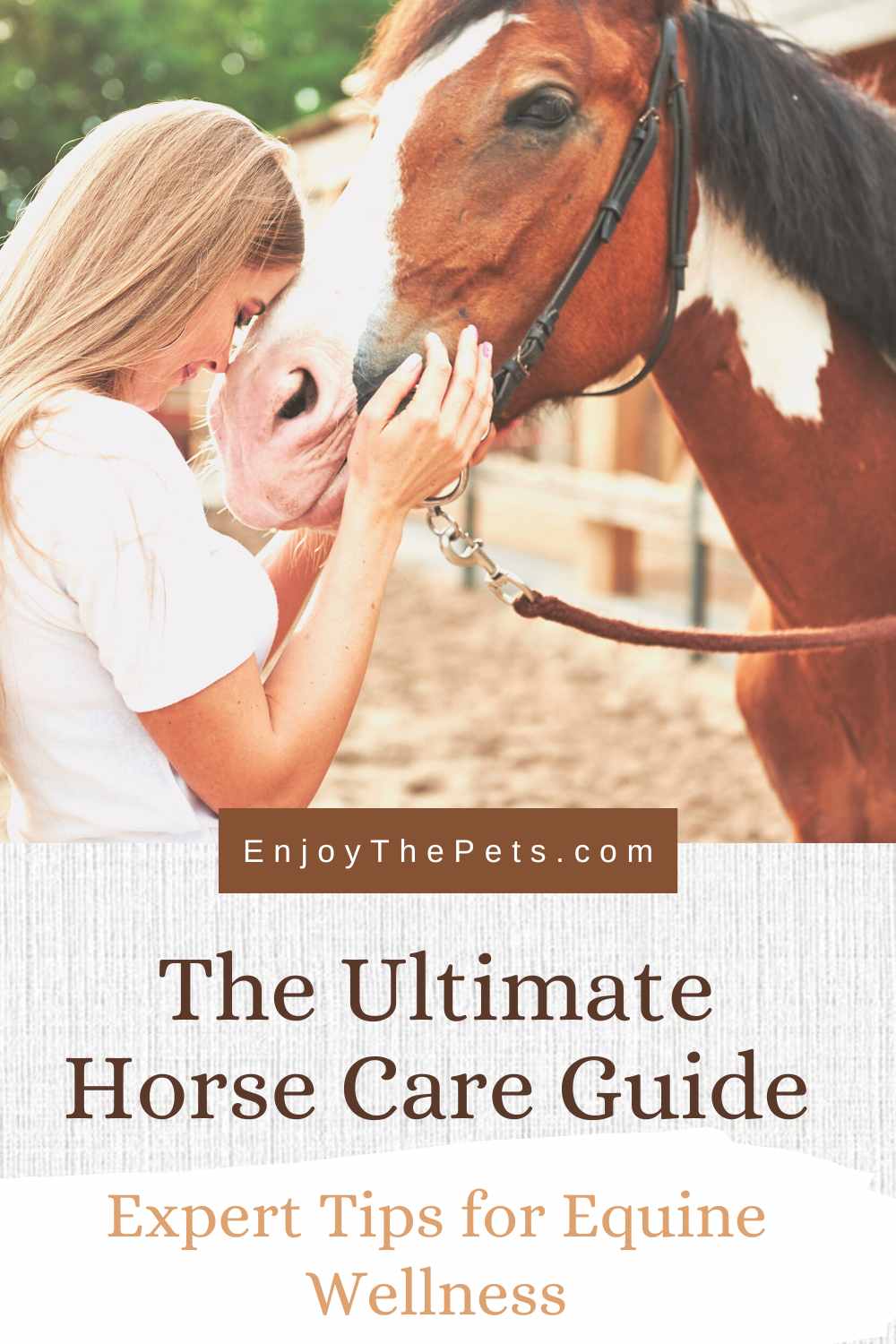The Ultimate Horse Care Guide: Expert Tips for Equine Wellness

Taking care of horses is not only a responsibility but also a rewarding experience for horse owners. Proper horse care ensures their overall health, well-being, and longevity.
This comprehensive guide will provide expert tips and advice on horse care, covering various aspects from creating a safe environment to nutrition, grooming, exercise, and emotional well-being.
Understanding Horse Care
Horse care involves a combination of physical, emotional, and environmental factors. By understanding the importance of horse care, owners can provide the best care possible for their equine companions.
The Importance of Horse Care
Proper horse care contributes to their physical and mental health. It helps prevent illnesses, injuries, and behavioral issues, ensuring a happy and contented horse.
Creating a Safe and Comfortable Environment
Providing a safe and comfortable environment is crucial for the well-being of horses. Attention should be given to stable and pasture management, shelter and bedding, and proper ventilation.
Stable and Pasture Management
Regular cleaning and maintenance of stables and pastures help prevent the spread of diseases and parasites. Adequate space and fencing are essential to prevent injuries and promote natural movement.
Shelter and Bedding
Horses need shelter from harsh weather conditions. Properly designed shelters with appropriate bedding materials ensure comfort and protect horses from extreme temperatures.
Proper Ventilation
Good ventilation in stables and barns helps maintain fresh air circulation and prevents respiratory issues. Adequate ventilation also reduces the risk of mold and ammonia buildup.

Feeding and Nutrition
A balanced diet and proper nutrition are fundamental for horse health. Providing the right type and amount of food, along with access to clean water, is essential for their well-being.
Balanced Diet and Forage
Horses require a diet that includes forage, such as hay or pasture grass, and concentrates like grains or pellets. The ratio should be adjusted based on the horse's age, workload, and health conditions.
Water Requirements
Access to clean, fresh water is vital for horses at all times. Adequate hydration supports digestion, regulates body temperature, and ensures overall health.
Supplements and Treats
Supplements may be necessary to meet specific nutritional needs or address health concerns. However, it's essential to consult with a veterinarian before introducing any supplements or treats to a horse's diet.
Grooming and Hygiene
Regular grooming and proper hygiene practices help maintain a horse's coat, skin, hooves, and overall cleanliness.
Regular Brushing and Bathing
Brushing horses regularly not only removes dirt and debris but also promotes circulation and distributes natural oils in the coat. Bathing should be done occasionally using horse-friendly shampoos.

Hoof Care and Farrier Visits
Routine hoof care, including trimming and shoeing, is essential to maintain proper hoof health. Regular visits from a farrier help prevent discomfort and lameness.
Dental Care
Horse teeth continually grow and need regular dental care to prevent issues like uneven wear or sharp edges. Routine dental check-ups and floating ensure proper chewing and digestion.
Exercise and Physical Health
Exercise plays a vital role in maintaining a horse's physical health. Regular exercise routines, along with vigilant monitoring for signs of illness or injury, contribute to overall well-being.
Regular Exercise Routine
Horses should engage in regular exercise, such as riding, lunging, or turnout, to promote cardiovascular fitness, muscle tone, and joint flexibility.
Recognizing Signs of Illness or Injury
Being aware of common signs of illness or injury allows early detection and prompt veterinary care. Monitoring changes in behavior, appetite, weight, and physical appearance is crucial.
Veterinary Care and Vaccinations
Regular veterinary check-ups, vaccinations, and deworming are essential for maintaining a horse's health. Vaccinations protect against common diseases, while deworming helps control internal parasites.

Emotional Well-being and Socialization
Horses are social animals that thrive on mental stimulation, social interaction, and positive human interaction.
Mental Stimulation and Enrichment
Providing mental stimulation through activities like puzzle feeders, obstacle courses, or varied training routines keeps horses engaged and prevents boredom.
Social Interaction with Other Horses
Allowing horses to interact with other compatible horses promotes natural herd behavior and satisfies their social needs. It can be done through turnout or pasture companionship.
Bonding and Building Trust
Establishing a strong bond and building trust between the horse and the owner through positive reinforcement, consistency, and gentle handling contributes to the horse's emotional well-being.
FAQs
How often should I groom my horse?
Regular grooming is recommended, at least once a day, to maintain a healthy coat and promote bonding with your horse.
What type of bedding is best for a horse?
Different types of bedding, such as straw, shavings, or pellets, can be used based on availability and the horse's specific needs.
How often should I have my horse's teeth checked?
Horse teeth should be checked by a veterinarian or equine dentist at least once a year to identify any dental issues and prevent discomfort.
Are supplements necessary for my horse's diet?
The need for supplements depends on the horse's specific nutritional requirements. Consult with a veterinarian to determine if supplements are necessary.
How can I prevent colic in my horse?
Providing a balanced diet, plenty of fresh water, regular exercise, and minimizing sudden changes in feed or routine can help prevent colic in horses.
Conclusion
By following the expert tips and advice provided in this ultimate horse care guide, horse owners can ensure their equine companions receive the best care possible.
From creating a safe environment to providing proper nutrition, grooming, exercise, and emotional well-being, every aspect of horse care is covered.
Save this PIN for Later 😊


You May Also Like 👇🏼